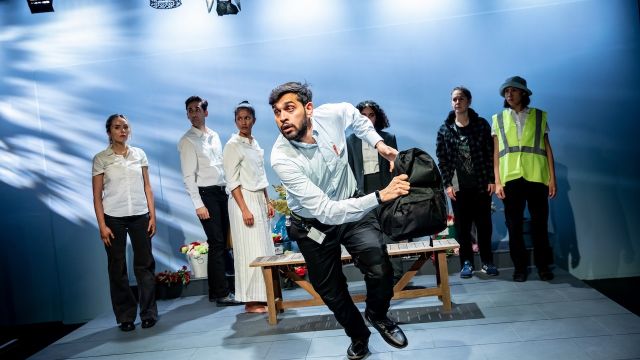By Katie Pollock. bAKEHOUSE Theatre Co and Nautanki Theatre. Director Suzanne Millar. KXT On Broadway and Riverside Theatre. 15 Sept – 8 Oct, 2023
Reviewed : 20 September, 2023*

Twenty-five gold birdcages hang above a city square bathed in blue pre-dawn light. Like the cages, the space is empty but for a figure shrouded in blankets. As morning light filters in, flowers set against a wall can be seen, and early morning birdsong sounds. But there are no birds.
It’s an eerie beginning to Katie Pollock’s play. But Sydney in the first few weeks of June 2014 was strange, different. The siege at the Lindt Café in Martin Place had left the city on edge, nervy, suspicious.
It is on one of those wintery June mornings that Katie Pollock’s play is set. But the play isn’t about the Lindt Café siege. It’s about the undercurrent of life that goes on despite disasters – the undercurrent keeps ebbing and flowing beneath the big tides that wash over busy cities.

Her characters are ordinary people who might have been in the city at that time. Some, certainly, because of the siege. Like a security officer. Or people laying flowers at a shrine. Or voyeurs. Others, oblivious of any ‘news’ or strangeness, are there for reasons much more personal.
Through those characters and their stories Pollock reminds us of the real reasons that motivate Human Activity.
There’s a young woman, escaping domestic violence, who hunts for her stolen bag and the money she has scrimped away to pay for an abortion. An old couple searching for the battered suitcase they carry every year on a pilgrimage in memory of their daughter.
A woman who sells bottles of water and soft drink from a stolen esky. Another who offers flowers to those who might want to “pay their respects”. A group of ghoulish teenagers who stare, gossiping … “she went to our school,” one boasts.
And, in quieter moments, a little regiment of hungry city birds parades the pavement, watching warily, hopefully, swiftly dissolving into the shadows at the slightest sound …
Suzanne Millar directs a cast of ten who breathe life into these very vivid characters. She skilfully ensures that their stories – cleverly told by Pollock in snippets, begun and interrupted, then taken up again – move smoothly and clearly, interspersed by the vigilant birds who creep out warily to forage among the debris of human activity.
The mood of this play could be oppressive, but Millar uses the choreography of the birds to add lightness and hope. Backs bent, heads down, they walk in harmony, under the empty cages, stopping at a noise, changing direction, moving away as the next ‘instalment’ of a story begins.

All cast members are part of this ‘avian routine’ that changes the aura of the production as effectively as Benjamin Brockman’s moody lighting and Jessica Pizzinga’s city sounds.
A constant in the production is Jana, the homeless woman who emerges from the bundle of blankets. Strong despite her situation – nay, because of it – Jana is belligerently vocal but caring and wise. Katherine Shearer finds that strength and wisdom in the Jana she plays. She gives her a vitality and energy that spurs her and infects those around her, especially Arti, the woman who has lost her ‘escape’ money.
Trishala Sharma plays that difficult role finding the anxiousness and fear that dog those caught in the twisted, knotted web of domestic abuse and control. She is constantly on edge, her distress evident in her frightened eyes, panicked voice, and eventual violent self-harm.
Claudette Clarke and Phillip Lye play the old couple still trying to understand their daughter’s ‘journey’ to escape her abusive relationship. Both bring a sense of confused despair to their story, a naïve simplicity that is out of place in the busy tension of the city at that time. Their quiet reasoning and trust in each other are very moving.
Atharv Kolhatkar plays a security guard who is keen restore order and compliance. He is nervous, still jumpy, anxious to move any ‘problems’ away from his jurisdiction – especially when the students, the drink lady and the flower seller – Josephine Gazard, Karina Bracken, Mason Phoumirath, Madhullikaa Singh and Teresa Tate Britten – get into a loud argument about flowers and stolen money.

No character is more poignant than the curious, hungry, brave cockatoo played with elegant, bird-like dignity by Karina Bracken, firstly as she warily approaches Arti in hope of some food and water – then as she perches alone in the dying afternoon light, explaining quietly that one of her claws which has withered and wasted due the effect of chewing, will mean that she will soon be unable pick up or hold any food …
There is human warmth, truth and understanding in this production. It comes originally from the Pollock’s compassion and empathy, and her deft creation of each character, but it is intensified by Suzanne Millar’s sensitive, perceptive direction and the collaborative approach she brings to all her work.
Also published in Stage Whispers magazine
*Opening night